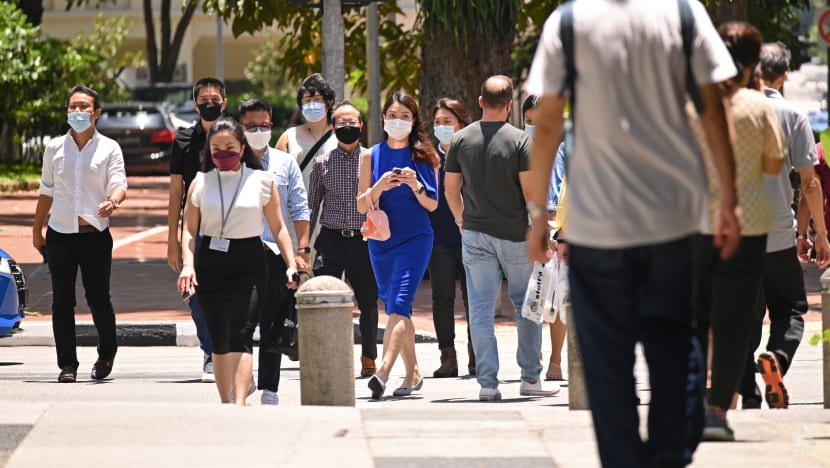Singapore will do more in fiscal, monetary policies if Ukraine conflict worsens: Lawrence Wong

People wearing protective face masks cross the road at Pickering Street in Singapore on Sep 6, 2021. (File photo: CNA/Gaya Chandramohan)
SINGAPORE: The Government will “not hesitate to do more”, be it through fiscal or monetary policy measures, if the conflict in Ukraine worsens and impacts the Singapore economy and inflation, said Finance Minister Lawrence Wong on Tuesday (Mar 22).
For now, it remains “too early” to tell how the situation will unfold and the Singapore economy is expected to keep growing this year, he said at a luncheon plenary held on the first day of the Singapore Apex Business Summit 2022.
Official forecasts are for the economy to grow between 3 and 5 per cent in 2022.
“Our baseline assumption and projection is still that we are still able to continue growing as an economy this year. But you cannot rule out more adverse situations or scenarios where potentially we enter a recession, or we start to experience stagflation-like conditions,” Mr Wong said.
“If things start to get worse in Ukraine and we see a huge impact on our economy or on inflation, we will certainly not hesitate to do more, whether through fiscal or monetary policy, to make sure that we keep the economy steady or stabilise prices.”
Mr Wong also noted that the support measures announced in the Budget last month have yet to take effect.
“We have put in place an expansionary Budget with many help measures for households, businesses and workers. None of these measures has even been rolled out yet,” he said.
“In the coming months, households, workers, firms will be … experiencing the effects of the Budget measures. So we should let that percolate through the economy and then monitor closely how the Ukraine situation will impact the economy in the coming months, as well as inflation.”
The lunchtime plenary session was moderated by Singapore Business Federation’s chief executive Lam Yi Young, who also asked if policy measures such as the carbon tax hike and tightening in foreign manpower policies could be pushed back so as not to add to the cost pressures faced by businesses.
In response, Mr Wong said the Government has been “very cognisant” of the challenges faced by businesses which is why policy changes have been staggered and announced in advance.
He also pointed out that the constraints faced by Singapore on labour and carbon are not temporary.
“It’s wishful thinking to sort of hope that some point down the road, we can do away with these constraints because we can’t,” said Mr Wong, adding that “so long as Singapore is successful as an economy, (it) will always have a tight labour market”.
Likewise, if Singapore wants to do something about climate change, it has to “move more decisively to reduce carbon”.
“So if we understand that labour and carbon will be permanent constraints in our economy, wouldn’t it be better for us to move early to adjust, restructure and transform our business processes to rely less on labour and to be less energy-intensive?”
Moving early will also position businesses in a “more resilient and stronger position” for the future which will be labour and carbon-constrained.
The minister said that many schemes and initiatives have been put in place to help businesses with transformation on these two fronts, but the take-up rates “always end up being lower” than what was budgeted.
“I will be very happy if this year, you surprise me with a much better take-up and the funds are fully utilised … and I'll be very happy to top up the budgets for these schemes and work with all of you to accelerate the restructuring and transformation processes in your businesses,” Mr Wong said.
Towards the end of the session, the minister said he understood that businesses, especially small- and medium-sized enterprises, are concerned about the “more pressing immediate issues” such as manpower and worker shortages.
That is partly due to Singapore’s border measures, which have not fully opened up for travel.
“But this is temporary. And with the COVID-19 situation in Singapore improving day by day ... I am quite sure we will soon be able to open up for freer international travel, and when that happens, it will be much easier for firms to bring in workers,” said Mr Wong.
“I hope that will provide some easing on the manpower front.”
Even so, a tight labour market is “not going to go away” so businesses will still have to embrace automation and digitalisation to become more efficient and productive, he added.
Another reason why manpower issues surface is because of “greater churn” in the economy, which will be a permanent feature.
“More churn means potentially more mismatches of skills,” Mr Wong said, adding that this is why the country is emphasising skills upgrading and training, as well as skill-matching efforts.


















